
Dominick Martin AKA Calibre: “By pursuing that simplicity you enter that state when you feel you’re watching yourself working”
How a ‘superstar DJ’ from the world of drum & bass is now embracing the art and craft of songwriting
For an electronic genre that rattles away at the brisk pace of 172BPM, that came from politically-charged UK rave culture and was built on breaking rules and pushing technology to make sounds it was never invented to make, drum & bass has more space to accommodate true songcraft than you might expect.
There’s enough space for everything – that was the whole idea. Double-time drum breaks were the canvas and outside influences were the colours. Hip-hop, dub, reggae, dancehall, soul, disco, rare groove… nothing escaped the original melting pot that drum & bass was founded on. Including original songwriting.
Goldie’s drum & bass blueprint album Timeless is one of the most famous examples of how songwriting can be incorporated into the genre. A seminal body of work tailored with delicate songs and lyrical elements, it set benchmarks that still exist to this day. Other famous examples include Pendulum, an act whose rock influences thrusted drum & bass into the UK Top 10, and DJ Fresh, an artist responsible for some of the late 90s/early 00s’ most uncompromising club tracks before proceeding to writing some of the genre’s most successful pop songs, including drum & bass’s first-ever number one.
Then there’s Dominick Martin, or Calibre as he’s better known. A Belfast-born, Monchengladbach-based artist who is a complete anomaly to those examples above and indeed drum & bass itself. A reserved and introspective musician, he was one of the first artists in the genre to write lyrics and sing on his own productions. Over the years he’s incorporated his own writing and distinctive vocal range into his productions to such a degree, it’s become part of his signature.
It’s even diverted into other musical realms. Under his real name Dominick Martin, he’s written two remarkable traditional song-based albums that touch on folk, jazz and blues. If you’re new to his work and aren’t quite ready for the more club-charged pace of his drum & bass, then they’re a great place to get acquainted – and both are pretty poignant documents.
The first Dominick Martin album, Shine A Light – landed in 2009 and was the result of him working through being attacked and hospitalised and recovering from alcohol addiction. The second album – Valentia – is a homage to an island where he writes a great deal of his material. The most westerly point in Europe, off the southwest coast of Ireland, it’s a place where he finds the strongest inspiration to pen upwards of four ideas a day.
With such a proliferation, it’s perhaps no surprise that he’s just released his 14th album – The Deep. Released just four months after his last album (the dub, ambient and techno-based album Grow) The Deep is inspired by the idea of a completely songwritten drum & bass album meant for home-listening experiences. It not only compounds his own body of work, fusing his Calibre and Dominick Martin work more than ever before, but it also compounds drum & bass’s capacity to be recognised as an artform with, as we’ve already stated, more than enough space accommodate true songcraft than you might expect…
You’re a producer, a DJ, a drummer and an artist. But would you describe yourself as a songwriter?
“I think I have a capacity to be a songwriter. A lot of things I do incorporate that partially, but the way I write music has largely been more of an instrumental approach, especially with the electronic production. But what I’ve been fascinated by since very early on in my career is to incorporate a songwritten idea within a production. Often with abstract, slightly weird or a wee bit off centre lyrics. Conventional lyrics haven’t resonated with me that much…”
Have there been any lyricists who’ve touched you?
“Joni Mitchell. She’s very clever with the way she tells a story. Especially on the album Hissing Of The Summer Lawns. Very poetic. Laurie Anderson’s O Superman was another song, perhaps the first song, that had a profound effect on me. I remember hearing it on Radio Luxemburg at night, it would bring me to tears. It’s epiphanic; it blows everything wide open. I’ve always felt Laurie had other intentions with the song but it bumbled into its own being. That’s what I love; how a song develops its own identity on its own terms and with its own energy.”
Your first experience as a songwriter was in bands, wasn’t it?
“Yeah, but I was a drummer so it took a long time for me to prove myself as a musician! The last band I was in, I did start writing songs and became more prominent in the writing process. I was given a keyboard and guitar pedals to add a little something to the song. In hindsight, the guys identified something in me that I hadn’t seen myself at that stage.”
What other instruments do you play?
“The drums are the one instrument I’m proficient in still, and have my own style. I’ve got my natural pitch but my keyboard playing only amounts to a few notes. Any of the instruments I’ve played on any of my songs have been very simple and amateurish, to my ear. I don’t need layers or details. Three or four notes played in a certain way is all I need.”
You touch on simplicity a lot.
“I would say so. By pursuing that simplicity you enter that state when you feel you’re watching yourself working – it’s happening naturally, you’re not thinking, you’re doing and you’re holding on the reins kinda controlling what’s happening. There’s something mysterious about that state. It’s not easy to get into it – you have to get there by hard work and technique and understanding your own creativity.”
When you’re in that state you’re quite prolific aren’t you?
“It’s hard to explain how it works. Sometimes I write out of spite and I’ll labour the shit out of it. Other times it’s all free-flowing and I’m chasing this energy. But it doesn’t mean what I get from that is any good. Sometimes the labour of love is the better song. I’m trying to figure this out myself but I know that when I visit Valentia I get this feeling like something has to happen. And I’ve set myself up in an environment where those things can happen.
When did you realise Valentia has the ability to make you do that?
“I’ve got a friend from the island whose family have been there for hundreds of years and have some crazy stories. It’s the sort of place that’s had a lot of things happening there, it seems to attract these events. And that seems to attract me. I’m a guest on the island and I feel very privileged for it. I’m not a rich man, but the island gives me the capacity to feel like one.”
Is that your sole writing space, then? Or do you write on the road or in your home in Germany too?
“I have a small space at home in Germany and another in my house in Belfast. I don’t like writing on the road much. I’ve written with Delroy [Manchester rapper MC DRS] in strange hotels around the world, but mostly I feel like the travelling and touring is my time to soak up the inspirations and influences that come out in the music. It’s a very stark dichotomy for me: there’s music-making and music-playing, and they’re very separate worlds. For other DJs it’s not, and you can hear that in their music – for good or bad. The clubs and DJ mentality dictate the direction and character of the music. I can’t do that.”
How do you fight the interference and influence of the DJ merry-go-round?
“It really is a merry-go-round! But all creative industries are like that. No one loves every step of the cycle, so it’s about relishing those moments that you do really appreciate and make it all worthwhile. I’ve always made sure I’ve had alternatives anyway. I’ve never been fixated with one thing or sound or style. I’ve evaded drum & bass protocol for so long I feel I can disappear and write a whole body of traditional songs or write something quite political…”
How much of your music is politically inspired?
“There’s resistance in a lot of my music. I’m pretty anti-establishment. Establishments are there to serve people who don’t want change. But I also don’t want that to define who I am. It’s like I’m telling you in passing, or as an additional layer, but it’s not the full substance. I love layering messages in lyrics in that type of way.”
How do lyrics come to life for you?
“Sometimes the words are just there and I find myself writing them down, but most of the time the words will follow after I’ve found a musical hook. All I need is a couple of notes to feel and see a melody or, like the lyrics, it’s already there in my head. I can hear songs in my head all the time, they’re just there as I’m falling asleep or waking up.”
Have you ever had a eureka moment in the middle of the night?
“No, once I’m in bed it’s a done deal! I’m not getting out for any song!”
Your track Even If is a popular sing-along number in the clubs. What’s the message there?
“War, basically. It’s one of the most documented and overly written horrors of humanity and we’ve become numb to its terrifyingly sad images and footage. People don’t think what they’re hoping and voting for. There’s a lot of anger in the song at how people don’t do any research or look into things themselves. They’re happy to be spoonfed bullshit and don’t even blink when they see dead bodies on the TV.
“Of course the crazy thing is, the song actually sounds so beautiful but the sentiment is overtly anti-war. Politics and religion often seem completely at odds with human rights and I will never be able to understand why.”
I once heard a rumour that Everything But The Girl wanted to remix your first vocal drum & bass tune Deep Everytime.
“This is the world according to [drum & bass pioneer] Fabio. They would come to his party called Swerve. I never saw them there but I was pretty drunk during that time. He told me that Ben, one of the duo, could hear something in my voice and wanted to remix me. But I couldn’t give him the tune if I wanted to… I’d destroyed the parts.”
Why? Was that a confidence thing?
“A lack thereof. Also drink, plus I felt bit ashamed of singing. Drum & bass at that time was a very masculine genre, and getting up and singing wasn’t the done thing. I don’t know. But whenever I released a track I would often destroy the parts so I couldn’t do it again.”
You didn’t destroy everything though. Your Grow project, for example, has work going back to that era…
“I did destroy most of it, sadly! I’ve become okay with that now. As long as there’s evidence of the music I’ve made, in some masterable quality, then it’s not lost. I’d be a lot more pissed off if I lost the work I’ve made in the last 10 years. Since I’ve been sober, basically.”
So your new album The Deep was intended as songwritten drum & bass album. Do you feel you achieved that ambition?
“Not really, because I wanted it to be genuinely away from the club but unfortunately the dominant vocal songs I’d written for it were working really well in the club! I wanted it to be more of a turntable at home album than the club album it feels like to me.”
It feels like both to me… isn’t that the holy grail for electronic songwriters who still enjoy smashing the club from time to time?
“I don’t know about completely enjoy – there’s always a sense of trepidation with any DJ set! But yes, to have something that works across contexts is a fulfilling feeling, but I’m always learning about the music, about myself.”
What did you learn the most during The Deep?
“I’m getting a wee bit better at reaching the falsetto notes! The opening track No One Gets You was a real labour of love in that way. I’d been working on it in Belfast for days and was determined to get something special from the session. Getting up to those higher notes takes a few goes, because if you falter just a little you really notice it, so the delivery has to be perfect. It’s a vocal style I’m finding I can really work with, and it’s taken a long time to really find. I can feel it opening other musical doors and I can work on it with more confidence. It’s accepted as part of what I do.”
I hear production and writing with other artists is becoming part of what you do, too…
“There have been more opportunities with genuine artistic motives recently, sure. I have to be purposefully vague here, but there are projects being discussed that I’d never have imagined before.
“I’m always pumping out drum & bass tunes, that’s always going to be there, but all this other music that I’ve been writing seems to be culminating in something too. And that excites me enough to reluctantly climb out of the undergrowth and accepting the idea that there is a wider audience to attract. It’s that confidence thing we touched on. I’m getting better at being – or at least pretending to be – a more confident human being.”
The Deep is out now on Calibre’s label Signature Recordings. To find out more, go to: signaturerecordings.databeats.com



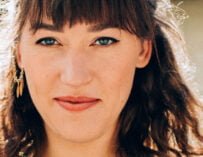


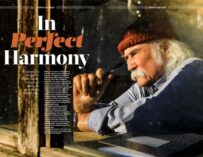


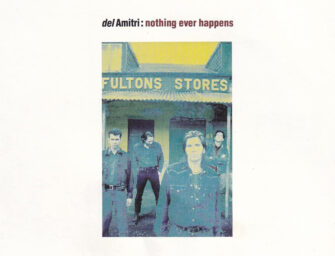

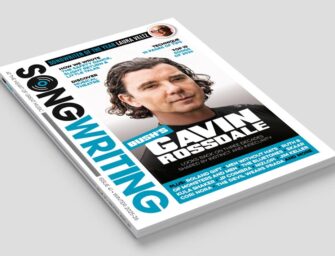
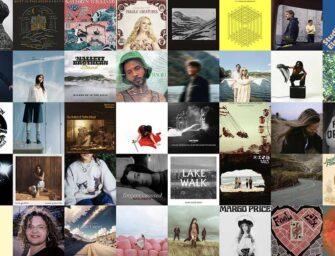



















Great interview, thank you. Calibre really is the music man!
Big up yourself Dominick.
The work you produce has always been top quality and you should always have maximum confidence!
Inspirational interview.
Please never stop writing Drum & Bass!
Even though it was a while ago, this interview is top notch. Great questions